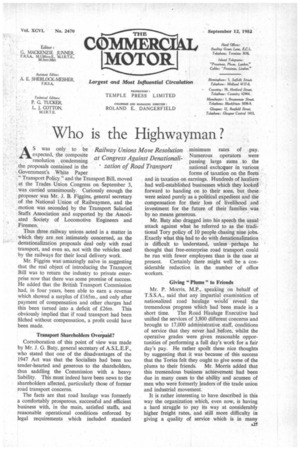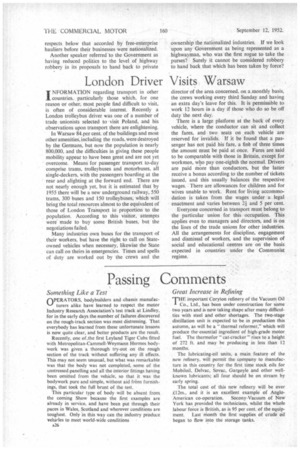Who is the Highwayman?
Page 27

Page 28

If you've noticed an error in this article please click here to report it so we can fix it.
S was only to be expected, the composite resolution condemning the proposals contained in the Government's White Paper ." Transport Policy "and the Transport Bill, moved at the Trades Union Congress on September 3, was carried unanimously. Curiously enough the proposer was Mr. J. B. Figgins, general secretary of the National Union of Railwaymen, and the motion was seconded by the Transport Salaried Staffs Association and supported by the Associated Society of Locomotive Engineers and Firemen.
Thus three railway unions acted in a matter in which they are not intimately concerned, as the denationalization proposals deal only with road transport, and even so, not with the vehicles used by the railways for their local delivery work.
Mr. Figgins was amazingly naive in suggesting that the real object of introducing the Transport Bill was to return the industry to private enterprise now that there was some promise of success. He added that the British Transport Commission had, in four years, been able to earn a revenue which showed a surplus of £165m., and only after payment of compensation and other charges had this been turned into a deficit of £.26m. This obviously implied that if road transport had been filched without compensation, a profit could have been made.
Transport Shareholders Overpaid?
Corroboration of this point of view was made by Mr. J. G. Baty, general secretary of A.S.L.E.F., who stated that one of the disadvantages of the 1947 Act was that the Socialists had been too tender-hearted and generous to the shareholders, thus saddling the Commission with a heavy liability. This must indeed have been news to the shareholders affected, particularly those of former road transport concerns.
The facts are that road haulage was formerly a comfortably prosperous, successful and efficient business with, in the main, satisfied staffs, and reasonable operational conditions enforced by legal requirements which included standard minimum rates of pay. Numerous operators were passing large sums to the national exchequer in various forms of taxation on the fleets and in taxation on earnings. Hundreds of hauliers had well-established businesses which they looked forward to handing on to their sons, but these were seized purely as a political expedient and the compensation for their loss of livelihood and investment for the future of their families was by no means generous.
Mr. Baty also dragged into his speech the usual attack against what he referred to as the traditional Tory policy of 10 people chasing nine jobs. Exactly what this had to do with denationalization is difficult to understand, unless perhaps he thought that free-enterprise road transport could be run with fewer employees than is the case at present. Certainly there might well be a considerable reduction in the number of office workers.
Giving " Plums " to Friends Mr. P. Morris, M.P., speaking on behalf of T.S.S.A., said that any impartial examination of nationalized road haulage would reveal the tremendous progress which had been made in a short time. The Road Haulage Executive had unified the services of 3,800 different concerns and brought to 17,000 adthinistrative staff, conditions of service that they never had before, whilst the operative grades were given reasonable opportunities of performing a full day's work for a fair day's pay. He rather spoilt these nice thoughts by suggesting that it was because of this success that the Tories felt they ought to give some of the plums to their friends. Mr. Morris added that this tremendous business achievement had been due in many cases to the ability and acumen of men who were formerly leaders of the trade union and industrial movement.
It is rather interesting to have described in this way the organization which, even now, is having a hard struggle to pay its way at considerably higher freight rates, and still more difficulty in giving a quality of service which is in many respects below that accorded by free-enterprise hauliers before their businesses were nationalized.
Another speaker referred to the Government as having reduced politics to the level of highway robbery in its proposals to hand back to private ownership the nationalized industries. If we look upon any Government as being represented as a highwayman, who was the first rogue to take the purses? Surely it cannot be considered robbery to hand back that which has been taken by force?




















































































